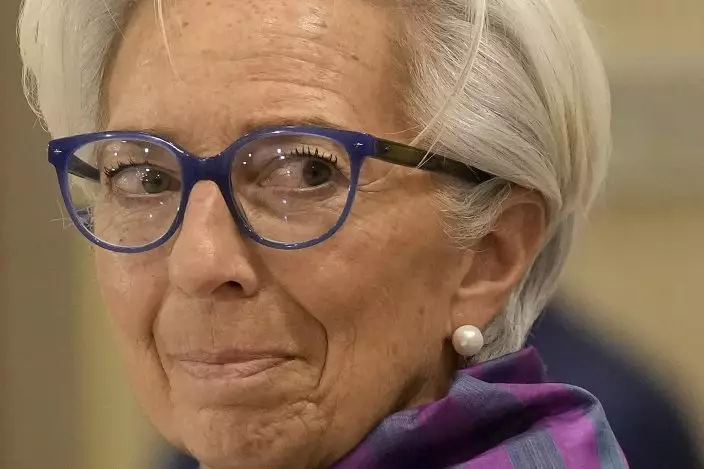Federal Reserve Chair Jerome Powell on Wednesday defended the Fed's increasing scrutiny of the threat that climate change could pose to the health of the nation's banks, after some Republican members of Congress had complained that by doing so the Fed was overstepping its mandate.
Over the past year, the Fed has taken steps to incorporate the risks from climate change into its oversight of the financial system. A key part of the Fed's mandate, in addition to setting short-term interest rates to either stimulate or slow the economy, is regulating banks to guard against excessive risk-taking.
Last year, the central bank joined an international organization of central banks and regulators to coordinate on managing the risks that climate change poses to the financial industry. In a report last year on financial stability, the Fed for the first time cited such risks and established an internal climate committee.
“The reason we’re focused on climate change is that our job is to make sure that financial institutions, banks, particularly the largest ones, understand and are able to manage the significant risks that they take,” Powell said in an interview with the Economic Club of Washington. “We see it only through the lens of that existing mandate.”
Climate risks include the potential for banks to hold too many mortgage loans for homes in coastal areas that are threatened by rising sea levels, or loans to oil and gas drillers that could fail if energy generation switches to renewable sources.
Last month, 12 Republican senators wrote a letter to Powell accusing the central bank of moving “beyond the scope of the Federal Reserve's mission.”
“We question both the purpose and efficacy of climate-related banking regulation and scenario analysis, especially because the Federal Reserve lacks jurisdiction over and expertise in environmental matters," the letter said.
The letter was signed by Sen. Pat Toomey, the senior Republican on the Banking Committee, and by Republican senators Richard Shelby of Alabama, Mike Crapo of Idaho and Tim Scott of South Carolina, among others.
The Federal Reserve must move faster than it has in the past to rein in high inflation, Chair Jerome Powell said Thursday, signaling that sharp interest rate increases are likely in the coming months, beginning at the Fed's next policy meeting in May.
In a panel discussion held by the International Monetary Fund during its spring meetings, Powell also suggested that “there's something in the idea of front-loading" aggressive rate hikes as the Fed grapples with inflation that has reached a four-decade high.
“So that does point in the direction of (a half-point rate increase) being on the table" for the Fed's policy meeting May 3-4, Powell said. Typically in the past, the Fed has raised its benchmark short-term rate by more modest quarter-point increments. When the Fed raises its rate, it often leads to higher borrowing costs for people and businesses, including those seeking to borrow to buy homes, cars and other costly goods.

FILE - President of the European Central Bank Christine Lagarde looks the Cyprus President Nicos Anastasiades during a press conference after their meeting at the Presidential Palace in the capital Nicosia, Cyprus, Wednesday, March 30, 2022. Lagarde could drop more hints Thursday, April 14, 2022 about when the bank will start raising interest rates, with pressure increasing to follow the United States, United Kingdom and other countries in taking a harder line to combat soaring consumer prices. (AP PhotoPetros Karadjias, File)
Wall Street investors already expect the Fed to raise its key rate by a half-point at its next three meetings, including those that will occur in June and July. Powell's comments Thursday underscored those expectations.
That would be the fastest tightening since 1994, when the Fed raised its rate by 1.25 percentage points over the course of three meetings.
By contrast, Christine Lagarde, president of European Central Bank, who took part in Thursday's discussion, sounded a much more cautious note. Inflation in the 19 countries that use the euro reached 7.5% last month, compared with a year earlier, the highest level since records began in 1997.
Yet Europe's economy faces a greater threat from Russia's invasion of Ukraine, which has sent food and particularly energy prices on the continent soaring and has weighed more on its economic growth than in the United States.
Lagarde said the ECB, at its next meeting in June, would decide when to end its program of bond purchases, which are intended to lower long-term interest rates. The Fed completed a similar effort in March. The ECB has set the July-September quarter as a target to stop buying bonds but hasn't been more specific.
One reason for Lagarde's caution, she said, is that about half of Europe's inflation is driven by high energy prices. Typically, interest rate policies can do little about such supply shocks.
“Our economies are moving at a different pace,” Lagarde said, referring to Europe and the United States, where growth has been faster. “Our inflation is fed by different components.”



